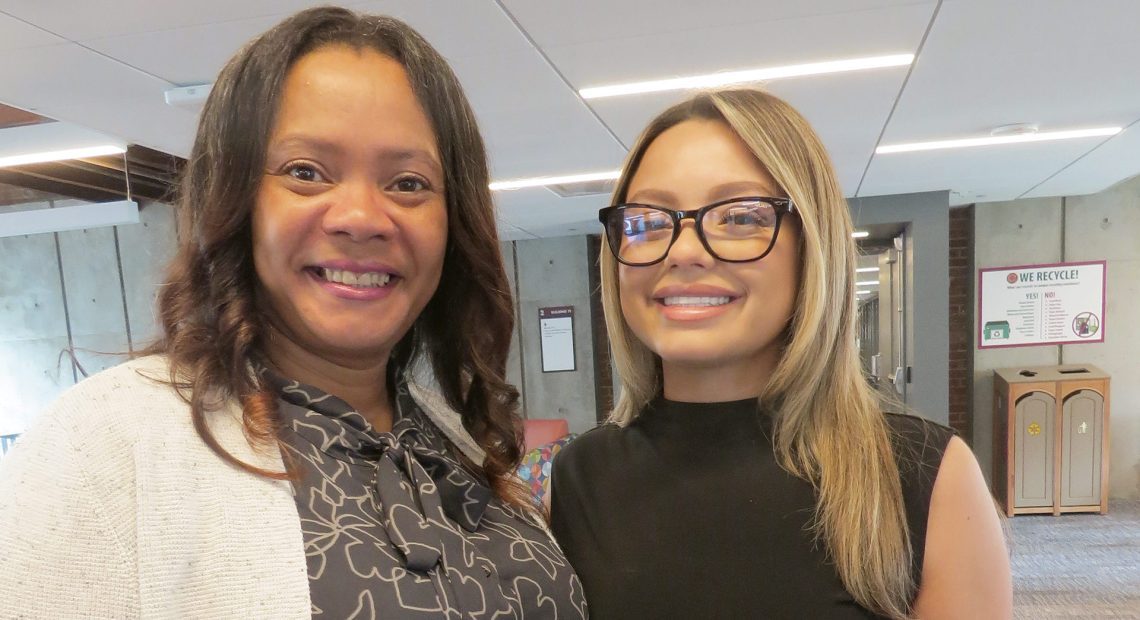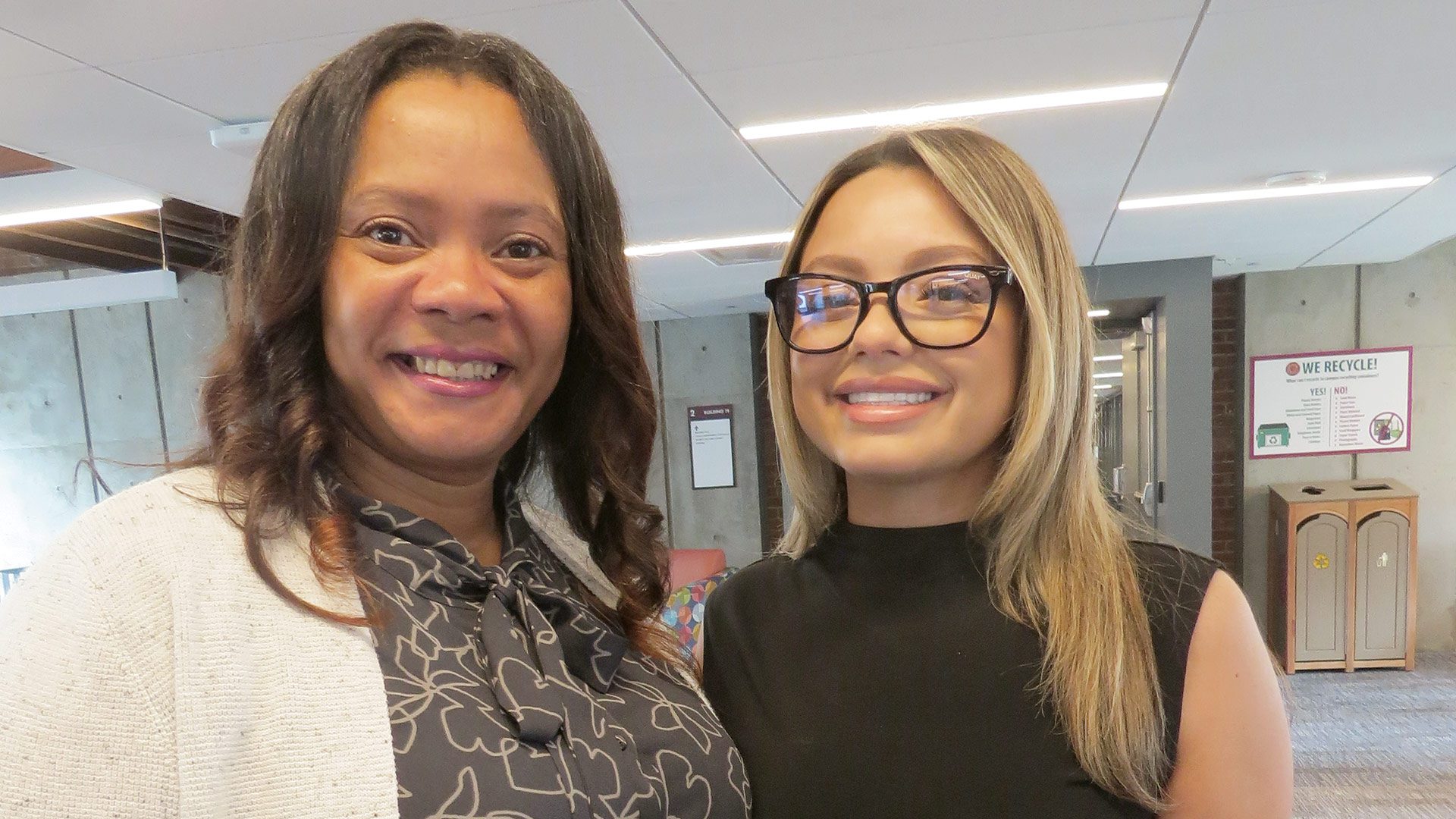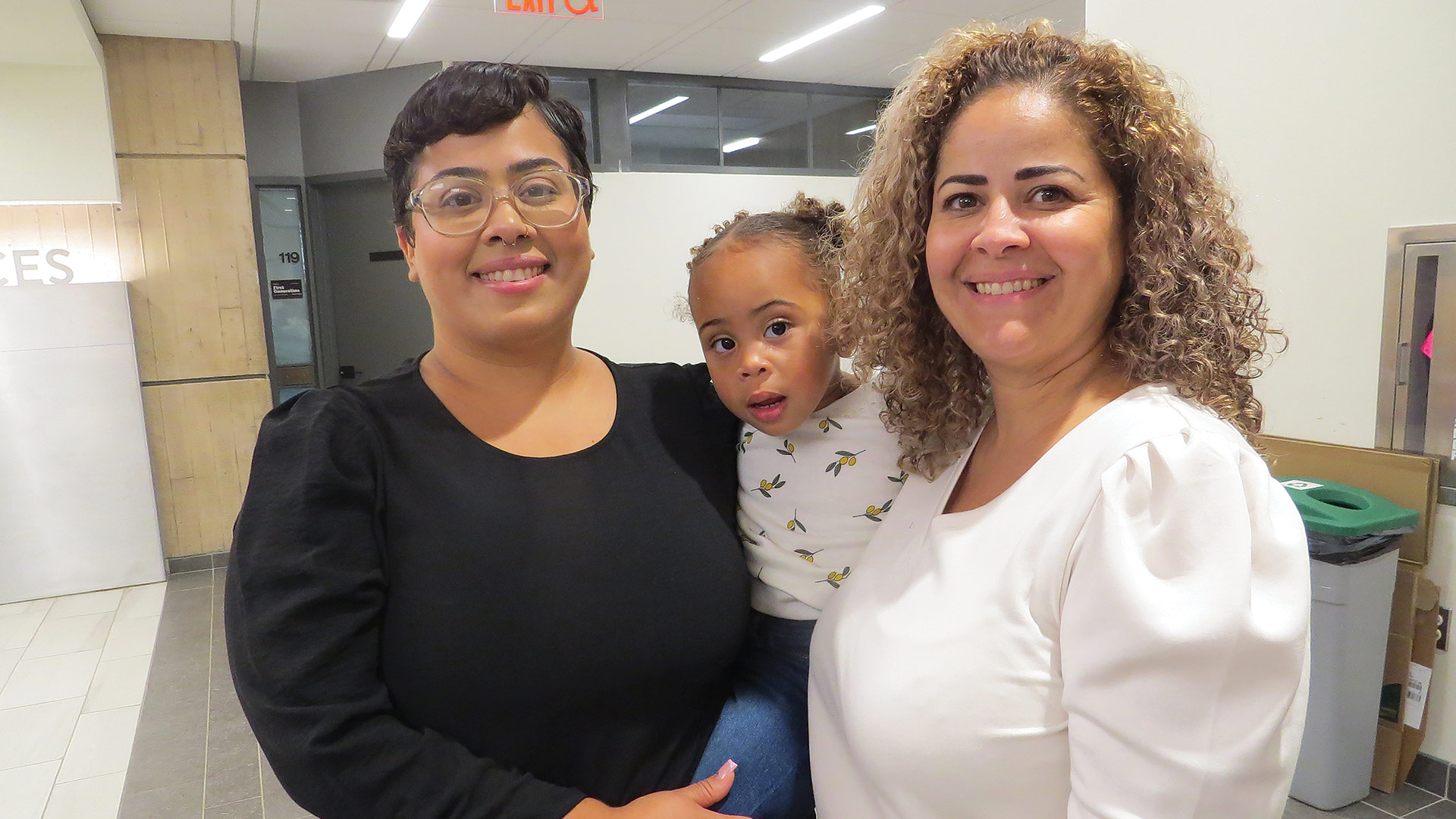
MassReconnect Is Altering the Paradigm at Community Colleges
Change of Course

STCC students Sarai Andrades, left, and Destiny Santos
Sarai Andrades is a second-year student at Springfield Technical Community College (STCC). She’s enrolled in the health sciences program, with the goal of starting work toward a nursing degree in 2024. Her ultimate ambition is to become a travel nurse.
To pay for her first year at STCC, she had to take on $5,000 in loans because she and her husband were earning too much to qualify for financial aid. But this year, she’s going for free, essentially, because of the MassReconnect program, which enables individuals 25 and over (she’s 49) to attend one of the state’s 15 community colleges without the burden of having to pay tuition — or even for books.
For Andrades, relief from the burden of debt is, in a word, “huge.”
Indeed, she eventually decided to resign from her job so she could attend school full-time, and the debt she took on for that first year was certainly burdensome.
“Not to take out a loan, not to be in debt when there’s only one income in my family, is a big relief for us,” she said. “Before, there was worry — this is a two-year program, and to become a full-time college student with only my husband working was going to be tough. I’m ecstatic that they’re doing this for us.”
With that, she spoke for hundreds of others in similar situations — and for administrators at the area’s community colleges, who have seen dramatic, and much-needed, increases in enrollment and vibrancy on their campuses this fall, and can attribute those increases, at least in part, to the MassReconnect program.
John Cook
“When you reduce this cost barrier all the way, people can now find the time and space in their lives to actually imagine themselves back here.”
“When you reduce this cost barrier all the way, people can now find the time and space in their lives to actually imagine themselves back here,” said John Cook, president of STCC, noting that the school has seen its first increase in year-over-year enrollment in more than a decade. “People really do want to make a difference for themselves and their families, and this is that thing that has really grabbed their attention and carved that space back out in their lives.”

Tim Sweeney is back on the campus at Greenfield Community College roughly 20 years after he left school to start working.
MassReconnect is a program created through legislation passed earlier this year, modeled on similar, and thus far successful, initiatives in other states, including Michigan and Tennessee.
For many individuals, the burden of tuition expenses and debt has kept them from attending school or forced them to the sidelines before they could complete a degree or certificate program, said Mark Hudgik, interim dean of Recruitment, Admissions, and Financial Aid at Holyoke Community College.
“We’re definitely seeing an increase in adult students applying and enrolling who had no college before, and we think that’s a direct impact of MassReconnect,” he said. “We also see a fair number who are coming back after a break.”
Linda Desjardins, director of Student Financial Services at Greenfield Community College, agreed.
“For some, coming up with a few thousand dollars for tuition and fees, plus another couple hundred for books, was making it difficult just to get here and get through the door,” she said. “This has just really opened up a new world for these students and new opportunities, which is great for the college and great for our student body because now we all have these diverse and enriching experiences coming into the classroom and on campus.
“And to see the amount of stress that just melts away from a student who was really worried about the cost — they’re thinking, ‘I know I want to come, I’m driven to do this, I want to change my life, but I’m going to have to give up groceries to pay for my books’ — it’s really encouraging,” she went on. “Now they don’t have to do that; they can concentrate on the work at hand in the classroom.”
For this issue and its focus on education, BusinessWest takes an early look at MassReconnect and the many ways it is changing the paradigm at area community colleges. Spoiler alert: you’ll read ‘it’s huge’ more than a few times.
Class Act
Tim Sweeney is back at Greenfield Community College, roughly two decades after he spent parts of five years there going to school — sometimes full-time but mostly part-time — in pursuit of an associate degree in liberal arts.
“I almost finished up, but was at a point in my life where I needed to support myself financially and concentrate less on school,” the 44-year-old told BusinessWest. “I never had the inspiration or motivation to go back.”
Mark Hudgik
“We’re definitely seeing an increase in adult students applying and enrolling who had no college before, and we think that’s a direct impact of MassReconnect. We also see a fair number who are coming back after a break.”
But through MassReconnect, he found that motivation, and he’s back on campus, taking the three courses he needs to complete that degree: “Gothic Literature,” “Interpersonal Communications,” and “American History, 1985 to the Present.”
His plan is … well, to graduate and then transfer to UMass Amherst to pursue a four-year degree. Beyond that, he doesn’t know … yet.
“I don’t have a particular direction yet,” he said, adding simply, “just forward — finally.”
Moving lives and careers forward is the basic motivation behind MassReconnect, which is designed to help people like Sweeney who had to put college aside, or who never got started in the first place, for any of several reasons, but often the cost of tuition — or even the cost of a semester or year’s worth of books.
For others, it is the apprehension of taking on debt, especially at a time in their lives when they have many other responsibilities — housing, children, and more — that keep them from taking an important step that might help them trade a job for a career.
But MassReconnect is about more than helping individuals and families cope with the cost of a community-college education, Cook said. It’s also about putting more individuals in a position where they can relieve some of the stern challenges facing employers in every sector of the economy when it comes to finding qualified talent.
And for community colleges, the program comes at a time when they are facing stern enrollment challenges that began before COVID and were exacerbated by the pandemic, to the point where, as Cook said, the schools had essentially reached bottom and “there was no place to go but up.”
It’s only been a few weeks since the start of the fall semester and the introduction of MassReconnect, but already there are signs that it is making an impact, though it will certainly take longer, at least a few years, before its influence on the workforce crisis is known.
For individuals of various ages and in various life situations, MassReconnect represents a chance to continue in school, or go back to the classroom, but without the financial burden. As DeJardins noted, the reduced stress is palpable, and is enabling individuals to focus all — or at least more — of their energy on what’s happening in the classroom.
That’s certainly the case for Destiny Santos, another student at STCC, now in her third semester, who has designs on being a nurse.

Solymar Fraticelli, left, and her mother, Nicole Rodriguez, are both attending HCC, while Fraticelli’s daughter is attending daycare there.
“What MassReconnect has done for me is allow me to go into this semester without the financial burden,” she explained. “And now that I’m 26, I have more things to care of; this program has allowed me to go to school knowing that everything will be OK, and I’ll be able to succeed without the burden of paying a school bill.”
Similar tones were struck by Nicole Rodriguez, 43, a second-year student at HCC who wants to advance within the human-services field, and her daughter, Solymar Fraticelli, 27, who returned to the school this fall after a lengthy hiatus.
Without MassReconnect, Rodriguez said, she would be facing a bill of more than $7,000 for tuition, fees, books, and more. And the thought of taking on debt to cover that bill is intimidating.
“That’s a lot for me, and it would likely limit me as I look to further my education,” she told BusinessWest, adding that MassReconnect has enabled her to continue without the burden of debt and, in so doing, helped inspire her daughter and other adults — her sister-in-law and best friend among them — to return to school or get started.
It’s been nearly eight years since Fraticelli first took classes at HCC — she attended for roughly a semester and a half before having to put her education aside — and she now has a daughter as well. The time gap and her parental responsibilities were just two of the factors to weigh as she considered the risks and rewards of attending community college and pursue a career in the healthcare field.
MassReconnect made it that much easier to meet those challenges head-on.
“I thought it was a great opportunity to go back to school,” she said, adding that her daughter attends daycare around the corner from the campus. “It’s free, or almost free, and that makes it that much easier to go back.”
For Sweeney, who has been unemployed for more than a year now, going back to school seemed like a more fruitful course than trying to test the current job market.
“I wanted to advance myself educationally in order to advance myself in my career,” he said, adding that being able to do so without having to pay for those three courses listed above certainly factored into his decision.
Degrees of Change
Meanwhile, the college administrators we spoke with said MassReconnect is at least partially responsible for a surge in enrollment they’re seeing this fall.
Cook said current enrollment at STCC has risen to 4,500, up from 4,000 a year ago. That number is still a long way from the 5,000 recorded in the fall of 2019, the last September before COVID, and a long, long way from the high-water mark of 7,000 notched in 2012, just a few years after the Great Recession.
But it is an important step in the right direction.
“For the first time in a decade, we’ve had a meaningful increase in enrollment,” he told BusinessWest. “We’re up 13% to 14%, and there are a number of factors involved with that, including MassReconnect.”
Desjardins agreed. She said the overall student headcount is up by 8.6% over last fall, a significant boost for GCC, one of the smallest community colleges in the state.
At HCC, enrollment had declined close to 30% during COVID, Hudgik said, adding that this fall, the school has seen its first increase year-over-year since 2010, with a 5.5% increase in total students and a 14% climb in new students, numbers that can be attributed at least in part to MassReconnect.
Beyond these soaring enrollment numbers, though, college administrators are buoyed by the stories behind the numbers — individuals who are returning to community colleges, or finding them for the first time years, and in some cases decades, after they graduated from high school.
And they’re attending school without having to borrow money, which removes a financial burden that weighs on individuals while they’re working toward a degree or certificate program.
Desjardins noted that the amount of grant aid Massachusetts residents is receiving has increased by 32% at GCC over last year, which represents more than $243,000. Meanwhile, the amount borrowed has dropped by 35%, or $123,000.
“Applications for federal financial aid have gone up by 16%,” she noted. “It could be for various reasons, but with all the attention that MassReconnect is getting — and the word is spreading — it’s safe to assume that MassReconnect is a good generator of that increase in financial-aid application.”
Like others, she is encouraged by the manner in which the program has enabled many who were not eligible for financial aid because they exceeded wage limitations to now attend community college without the burden of paying for it directly or taking out loans to be paid back over several years.
“The thing that’s most remarkable to me, in my position, is how low- to middle-income wage earners who have been left out of receiving free dollars for college, like grants and scholarship dollars, are now eligible to get this money to attend college,” Desjardins said. “If you were someone who was 25, single, with no children, and you made a little over $30,000 … before MassReconnect, you may have been eligible for just a few hundred dollars for the entire school year; now, you’re eligible for enough free money to pay for your tuition and fees, plus give you something toward the cost of books and course materials. That’s huge. Someone who is a low- to middle-wage earner is struggling already to pay their rent, their mortgage, childcare, groceries, gas, and more.”
Hudgik agreed. “Loans are scary,” he said. “MassReconnect allows them to not have to worry about the income threshold; they know the Commonwealth will support them and minimize the amount of loan they have to take out, and bring it to zero if they want.”
And while community college is essentially free for these individuals, the administrators we spoke with said this hasn’t diminished the value of the education their schools provide or lessened the degree of grit and determination behind the decisions to go back to school or attend for the first time.
“What we know to be true about our adult students is that, when they make the decision to come, it is usually with a lot of thought behind it,” Hudgik said. “It’s a fairly big risk for someone who has been out of school for a while to try to restart their school-going mentality. If they’ve decided to come, they’ve usually been pretty serious about it.”
Bottom Line
When asked what it was like to be back on the GCC campus 20 years after he last attended a class there, Sweeney said it was strange on some levels, and there was a period of adjustment, but, overall, he’s comfortable — with both his decision and with being back at school.
“I feel like I’m a different person than I was,” he said, adding that he realizes the importance of a college degree to advancing himself professionally, and just needed some motivation to take this big step.
This is what MassReconnect is all about, and while it will take some time to effectively quantify its impact on many different levels, at the moment, to those surveying the scene, it is a qualified success.







